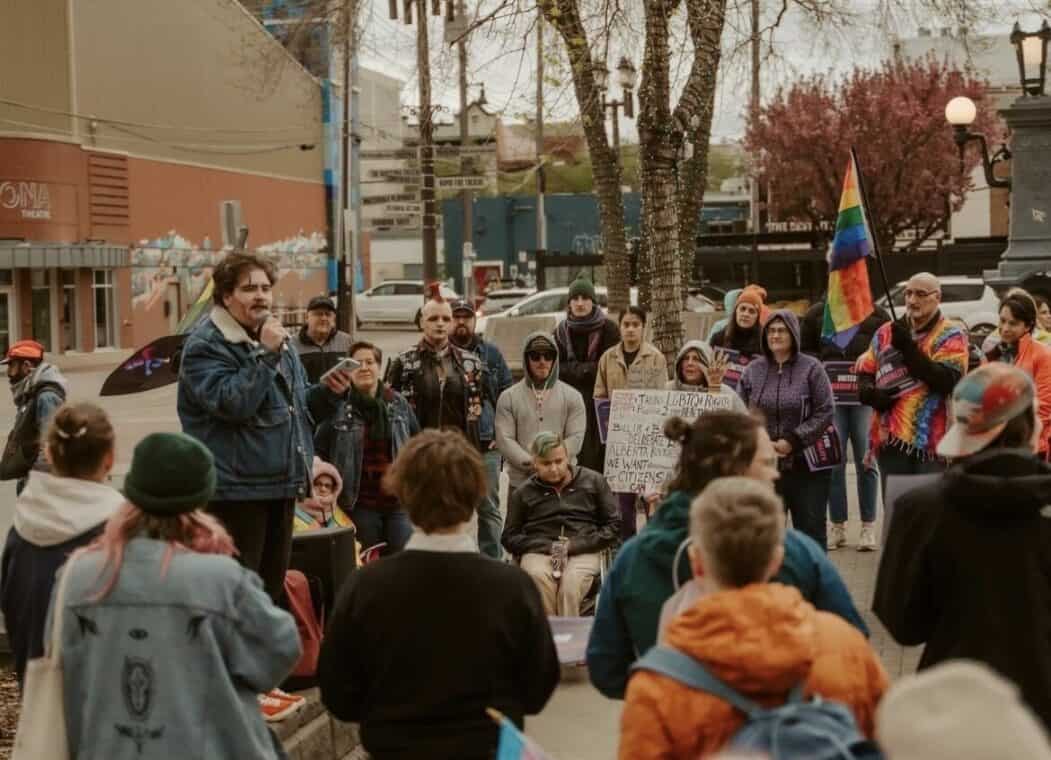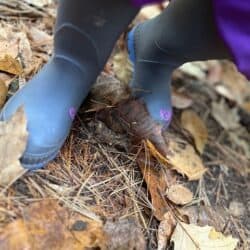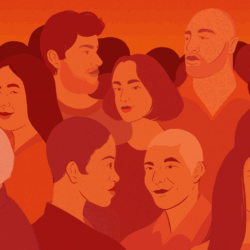In January, Alberta became the third province to announce restrictions on gender-affirming care for teens. But this hasn’t stopped 2SLGBTQIA-serving organizations from advocating on behalf of youth and their families, combating misinformation, and providing protection against hate crimes.
I fell in love with a boy when I was 18 or 19. East-African, from Toronto – he was a student at Carleton University, while I studied psychology and English at the University of Ottawa. We met through mutual friends and dated for two or three months. I wrote many songs about him, and after we broke up and she came out as a woman, I wrote about that, too. My next partner was non-binary. With them, the infatuation hit me just as instantaneously; our romance was equally short-lived.
Gender is an expanse. Identity – even more so. What does it say about me, that I feel most secure in my manhood when I am performing a song from Beyoncé’s catalogue? That as a teen, felt most in love when my lover was docile like an angel, hard as a rock? And who’s to say that these contradictions should be feared, inhibited, and policed?
One in 300 Canadians over the age of 15 – or 0.33% of the population – identify as transgender or non-binary. And yet, transgender and non-binary people are far more likely than other Canadians to experience violent victimization: in 2021, hate crimes targeting sexual minorities rose by 64%. Yes, far-right extremists with harmful ideologies are partly to blame, but when our elected officials parrot similar bigoted rhetoric, appeal to Conservative voters by cracking down on services known to improve the lives of transgender and non-binary people significantly, it only emboldens bad actors to feel justified in their beliefs and actions.
On January 31, 2024, Alberta Premier Danielle Smith announced multiple restrictions to the rights and liberties of transgender teens. This includes requiring students 15 and under to obtain parental consent if they would like to change their given names or the pronouns they use to refer to themselves. In addition, the province will introduce new restrictions to gender-affirming care: puberty blockers and hormone therapies will no longer be available to youth 15 and under. But it doesn’t end there: Smith and the United Conservative Party of Alberta are also restricting the ability of transgender athletes to participate in sports. “There are obvious biological realities,” Smith said, “that give transgender female athletes a massive competitive advantage over women and girls,” a notion that has already been debunked by transgender activists and advocates from the medical community. For example, the Canadian Centre for Ethics in Sports stated that “available evidence indicates trans women who have undergone testosterone suppression have no clear biological advantages over cis women in elite sport.”
Transgender communities and their allies rely on the non-profit sector to advocate for gender-affirming care. To Fae Johnstone, executive director of Momentum, a national queer and trans advocacy organization mandated to accelerate social and gender justice for 2SLGBTQIA+ people in Canada, the proposed legislation signifies a regression in the rights of queer and trans people, and those of their families, too. “We know that trans kids are less likely to engage in sports because they’re less likely to feel safe,” Johnstone says. “What this is doing is furthering a legacy of exclusion in sports. That is something we should afford to every young person, because it leads to healthy and happy adults.”
Johnstone stresses the lack of consultation with service providers, transgender teens, and their parents before the new policies were introduced. For instance, the redundancy in further restricting gender reassignment surgeries, considering you currently have to be 16 to qualify for top surgery in Canada and bottom surgery is accessible only to those who are 18 and older. Not to mention, studies show the positive effects of gender-affirming hormone therapy for trans youth, especially when started around 14 or 15 years of age.

Johnstone also questions Smith’s decision to focus on gender-affirming care for teens rather than the more tangible problems plaguing Albertans. She says it’s important to note that “at a time where folks are struggling to get access to a family doctor, where they’re dropping the ball on addressing the substance-use crisis facing folks across the province, and when politicians don’t have solutions to the big issues facing their constituents, they often dabble in this culture-war rhetoric.”
When it comes to Alberta, we’ve got a campaign going to hold Premier Smith accountable. Our focus is to stop [Conservatives] from making life harder for trans people and their families.
Fae Johnstone, Momentum
Momentum is prepared to support trans communities in Alberta as they respond to the new legislation. During the lead-up to the 2022 Ontario provincial election, the non-profit rallied 2SLGBTQIA+ organizations, allies, and leaders in a campaign that ensured that trans and queer issues were put on the agenda. “Ontario is a great case study of how we can bring folks from across the sector together and engage with our elected officials,” Johnstone says. “When it comes to Alberta, we’ve got a campaign going to hold Premier Smith accountable. Our focus is to stop [Conservatives] from making life harder for trans people and their families.”
***
Alberta is the third province to require students of a certain age to obtain parental consent before changing their names or pronouns at school: in 2023, Saskatchewan and New Brunswick introduced the same requirement for students 16 and under – the latter having to invoke the notwithstanding clause to uphold the legislation in response to public outcry and court challenges. Simply put, these kinds of requirements are at odds with our understanding of bodily autonomy as defined and protected by the Charter of Rights and Freedoms. Transgender teens, who are twice disenfranchised – once for their youth, and again for their transness – aren’t well-placed to maintain agency over their bodies if they must ask for permission before they can use a name or pronouns that affirm their gender. For non-profits serving trans and queer communities, the need for capacity-building at the grassroots level and strong advocacy at all levels of government becomes self-evident.
Organizations like the Get REAL Movement play a crucial role in combatting discrimination against transgender teens. The Toronto-based non-profit provides educational workshops in schools and workplaces across Canada to dismantle harmful ideas about transness and gender-affirming care.
Humanizing our experience is super important to us. What’s needed more than ever is for us to speak specifically to these policies.
Wren Bond, Get REAL
“Humanizing our experience is super important to us,” says Wren Bond, Get REAL’s education and DEI manager. “What’s needed more than ever is for us to speak specifically to these policies. We do a lot of workshops with adults, school staff, caregivers, and in corporate [settings]. A lot of people are surprised that this was going on in Alberta.”
Bond stresses the importance of dismantling mis- and disinformation about gender-affirming care, specifically among parents and caregivers, as adults are the ones with voting power. “We all have a role to play in making sure our youth are taken seriously, that we’re protecting them and talking to politicians,” they add.
***
Threats of violence against gender-diverse and trans high school and university students have grown exponentially in the United States and Canada. Data from the Federal Bureau of Investigation show that an average of 232 hate crimes were committed on US high school or college campuses in 2021 – more than double the yearly average from 2015 to 2019. In states with rigid policies affecting gender expression, the average number of hate crimes on K–12 campuses more than quadrupled during the same period.
In mid-February 2024, weeks after Alberta announced its suite of policies concerning trans youth, the Canadian Security Intelligence Service (CSIS) warned that violence against trans and 2SLGBTQIA+ communities was “almost certain to continue.” According to CSIS, the biggest threat comes from right-wing extremists emboldened by the “anti-gender movement,” such as the former University of Waterloo student facing 11 terrorism charges for stabbing an associate professor and two students during a gender-studies lecture in June 2023.
The Enchanté Network – Canada’s largest network of 2SLGBTQIA+ community organizations – has chosen to respond proactively to rising threats against queer communities. In March, the network launched the Rainbow Resilience Fund, raising more than half a million dollars. Member organizations can apply for a one-time grant ranging from $10,000 to $25,000 to develop preventative measures to stop hate crimes before they happen, or respond to emerging needs after a crime has occurred.
We were getting a lot of calls from member organizations experiencing death threats and physical hate crimes.
Tyler Boyce, Enchanté Network
“There were a lot of national organizations and funders that were talking about anti-trans hate, but no one was really doing anything about it,” says Tyler Boyce, executive director of the Enchanté Network. “It’s mostly to queer and trans community centres that trans people are going to access gender-affirming care. What happens when someone like Danielle Smith starts fanning the flames of transphobia is these places become targets for the worst, most violent parts of society.”
“We were getting a lot of calls from member organizations experiencing death threats and physical hate crimes,” Boyce adds. “Being able to provide grants of [up to] $25,000 to prepare an emergency preparedness plan, update policies, put in security cameras, is what we decided to do to practically combat hate.”
A number of recipients were from Alberta, which further emphasizes the dire state of affairs in that province. The fund is a step in the right direction, and Boyce hopes to extend the conversation on hate crimes and strategize at the Enchanté Network’s annual conference – the largest gathering of 2SLGBTQIA-serving organizations in Canada – in September. Coincidentally, this year’s conference will take place in Calgary.
***
Gender-affirming care saves lives. You don’t have to date a trans or non-binary person to know this. As trans and gender-diverse communities become increasingly targeted by conservative leaders, advocacy and allyship from the non-profit sector become indispensable. Whether it’s lobbying politicians, educating parents and caregivers, or resourcing communities to respond to hate crimes, we all have a part to play in ensuring that trans youth are protected and cared for.
“We need non-profits to work together to ensure trans young folks and their families have access to local services that meet their needs,” Johnstone says. “It is only through a strong, coordinated, and strategic movement that we will be able to stop regression and get back to building the kind of country we can all be proud of.”


